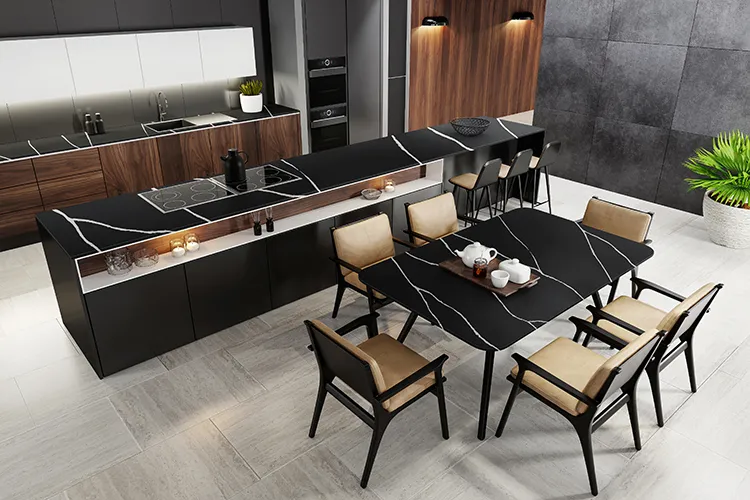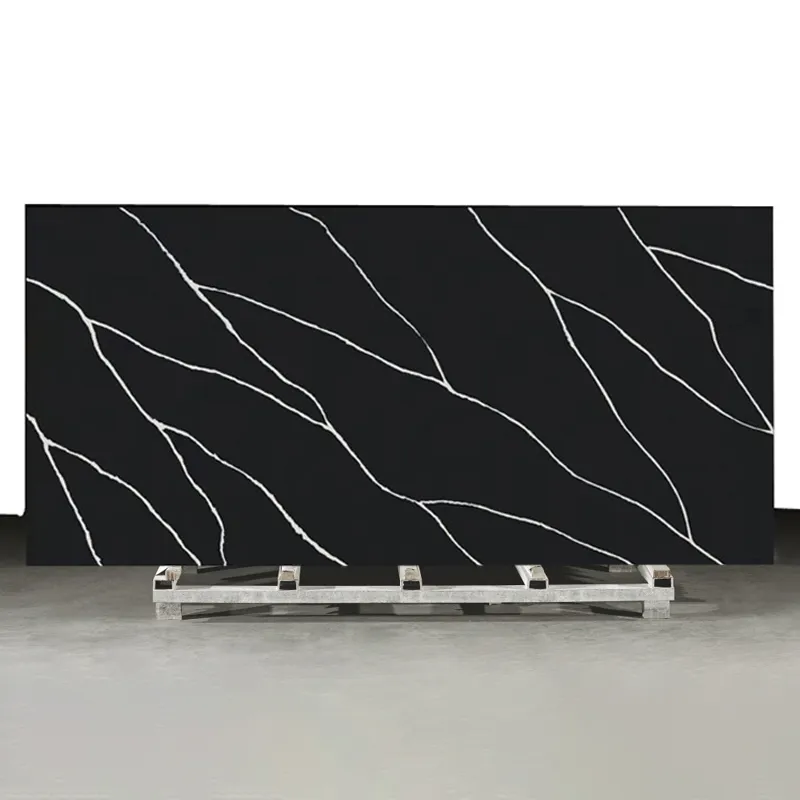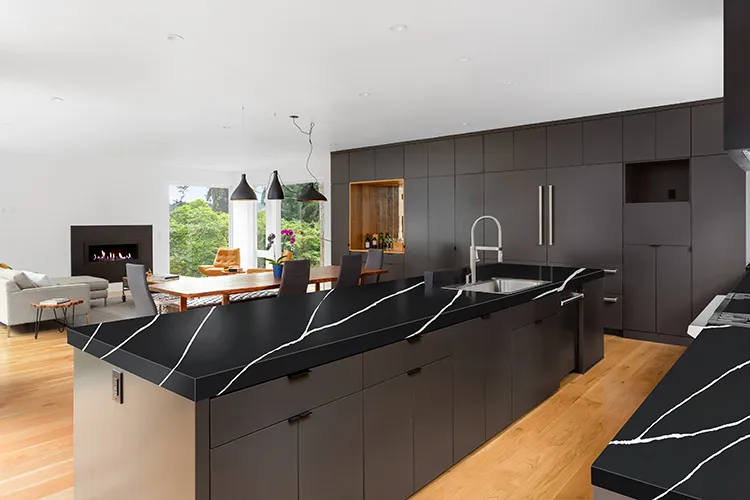As a popular material in modern kitchen and bathroom design, quartz countertops have been widely used for their durability, stain resistance and aesthetics. Black quartz countertops are especially popular for their simple, classic appearance and high-end feel. However, some users have found that the surface of black quartz worktops becomes cloudy and loses its luster over time, affecting the original beauty. Why does this problem occur on black quartz countertops? How does this turbidity occur? And how to effectively clean and maintain black quartz worktops to avoid this situation?
This article will explore the causes and mechanisms of turbidity on black quartz countertops from multiple aspects, and provide solutions to help users effectively deal with the turbidity problem on the countertops and restore the original luster and beauty of the countertops.

Basic structure and characteristics of quartz countertops
Before deeply analyzing the reasons for the turbidity of black quartz countertops, it is crucial to understand the basic characteristics and structure of quartz countertops. Quartz countertops are made of a mixture of natural quartz particles, resins, colorants and other auxiliary materials. This artificial stone combines the hardness of natural quartz with the bonding properties of resin, so in many home and commercial kitchens, quartz countertops are favored for their durability, stain resistance and low maintenance costs.
Black quartz worktops are one of the common choices, often used to create modern, simple kitchen and bathroom designs due to their smooth surface and deep color. However, the color of black countertops is particularly prone to showing stains, scratches or turbidity on the surface, especially in places with strong light.
What are the main reasons for the turbidity of black quartz worktops?
There are many reasons why black quartz worktops become turbid, which can be attributed to physical, chemical and improper maintenance during daily use. Here are a few of the main reasons that may cause countertops to become turbid:
1. Surface contamination and stains
Although quartz countertops have a certain degree of stain resistance, oil, water stains, food residues, etc. tend to accumulate on the countertops during daily use. Black quartz countertops are particularly prone to showing stains such as grease, fingerprints, and scale, especially under the exposure of light, these stains will be particularly obvious, forming a turbid effect.
● Grease accumulation: When cooking, grease can easily splash onto the countertop. If not cleaned in time, these greases will seep into the countertop over time and form greasy stains.
● Water stains and mineral accumulation: Minerals in water, such as calcium and magnesium, especially in hard water areas, will leave scale. When these minerals accumulate on black countertops, they can easily create a cloudy appearance.
● Food residue: The colors of foods such as fruits, vegetables, coffee, and red wine can also easily leave marks on black quartz countertops, especially if they are not cleaned in time. Long-term accumulation can cause stains to form.
2. Use improper cleaning agents
Using inappropriate cleaning products may cause damage to black quartz countertops, causing their surfaces to look cloudy or worn. Many traditional cleaners contain acidic or alkaline ingredients. Long-term use of these cleaners may damage the resin layer on the surface of the countertop, thereby affecting the gloss of the countertop.
● Acidic cleaners: Cleaners containing ingredients such as citric acid and vinegar may corrode the surface of quartz countertops, causing the surface to lose its gloss and become cloudy.
● Alkaline cleaners: Alkaline cleaners may also react with quartz countertops, causing the surface to turn white or become matte.
● Strong cleaners: Some strong detergents may remove the gloss from the countertop surface, and long-term use of these cleaners may cause the countertop to become dull.
3. Scratches and surface damage
Black quartz worktops are prone to surface scratches, especially when using hard objects such as knives and cutlery in the kitchen. These scratches not only affect the appearance of the countertop, but may also become a "hotbed" for stains and grease accumulation. Where scratches accumulate, stains and moisture can easily penetrate, causing localized turbidity.
● Hard object collision: The collision of knives, pots and other items with the countertop, especially when the countertop is unprotected, will cause scratches on the surface, and long-term accumulation may make the overall appearance of the countertop no longer smooth.
● Scratches during cleaning: Careless use of hard brushes or overly hard cleaning cloths may cause surface scratches and increase the chance of countertop turbidity.
4. Natural aging and environmental factors
Although quartz countertops are highly durable, over time, especially in direct sunlight, the surface may age due to UV radiation and climate change. This aging process not only causes changes in surface color, but may also cause surface turbidity.
● UV radiation: Long-term exposure to strong sunlight will cause chemical reactions on the surface of quartz countertops, which will make the countertops yellow and turbid.
● High temperature and humidity changes: Changes in climate conditions may also cause the surface of the countertop to gradually undergo physical changes, causing it to lose its original luster.

How to clean and maintain black quartz countertops to avoid turbidity?
To maintain the luster of black quartz worktops and avoid turbidity, proper cleaning and maintenance are essential. Here are some effective cleaning and maintenance suggestions:
1. Regular cleaning
● Timely wipe: Wipe the countertop with warm water and mild detergent every day, especially after cooking or use, which can effectively remove stains such as grease and water stains and prevent stains from accumulating and penetrating.
● Avoid stain accumulation: For substances that are easy to stain, such as food and drinks, try to avoid direct contact with the countertop, or wipe it in time after contact.
2. Choose appropriate cleaning products
● Mild detergents: Avoid using detergents containing acidic or alkaline ingredients, and choose mild detergents designed specifically for quartz countertops to avoid damaging the surface.
● Avoid using abrasives: Try to avoid using rough cleaning cloths or abrasive tools such as steel balls, which can easily scratch the countertop and leave marks.
3. Avoid contact with strong chemicals
● Prevent contact with acidic substances: Avoid allowing acidic substances such as lemon juice, vinegar, and alcohol to contact the countertop for a long time. These substances may corrode the quartz surface and cause turbidity.
● Prevent direct contact with high-temperature objects: Although quartz countertops are heat-resistant, you still need to avoid placing overheated pots or utensils directly on the countertop, which may cause discoloration or aging of the surface.
4. Regular deep maintenance
● Use special care oil for quartz countertops: You can regularly use some care oil or polish designed for quartz countertops to polish the surface and restore the gloss of the countertop.
● Avoid heavy objects from falling: Avoid hitting the countertop with hard objects, especially sharp objects, to avoid scratching the surface.
5. Professional cleaning and maintenance
If the quartz countertop has serious turbidity or stains, you can consider asking a professional cleaning company for deep cleaning. Professional cleaning agents and equipment can more effectively remove accumulated stains and restore the original gloss of the countertop.

Are you seeking high-quality building materials at affordable prices?
Look no further than Foshan Rongguan Glass Material for Building Co., Ltd. (Rongguan). With decades of experience and a strong commitment to innovation, we manufacture a wide range of products, including quartz stone countertops, artificial marble, terrazzo flooring, and roof clay tiles. Our ISO-certified factory is equipped with modern production lines and staffed by a skilled technical team, ensuring top-notch products that exceed customer expectations. We serve global markets, including Europe, the Middle East, and Southeast Asia, offering competitive prices and promotional discounts for bulk orders. Contact us today for customized solutions and discover why Rongguan is a trusted name in the industry.

